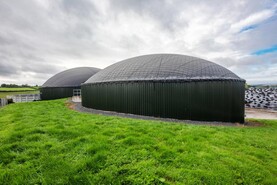Fodder and bedding stocks
Anaerobic digestion (AD) plants and large-scale biomass burners are putting additional pressure on fodder and bedding stocks for farmers, the National Sheep Association (NSA) has said.
The lobby group is calling on policy makers to revise renewable energy incentives after Brexit and to consider the impact that some technologies have on the availability of fodder and bedding.
“The risk of feed and bedding shortages is fast approaching, and costs are rocketing, yet potential feed stock, cereals, maize and grass, as well as straw for biomass, is dedicated to energy production,” NSA chief executive Phil Stocker said.
“If land being cropped for AD plants was still growing crops for livestock feed, there would be far less concern over the increasing risk of winter feed shortages,” Stocker added
The NSA also questioned why land which is used to fuel AD plants is eligible for Basic Payment while the AD plant is also receiving incentives for renewable energy generation.
“Dual-funding of land specifically for this form of energy production is particularly unsettling given that growing crops for digesters and burners takes land out of food production,” Stocker said.
Report sheep worrying incidents
Changes to law which would give police more power to deal with dog attacks on sheep can only be introduced if more farmers report incidents of sheep worrying.
In a statement last week, Eleanor Phipps from the National Sheep Association (NSA) said that proposed amendments to the Dangerous Dogs Act could allow police officers to tackle sheep worrying incidents more effectively.
“With sheep worrying by dogs, we will only see legislative changes made if the official statistics more accurately portray the magnitude of the problem; under-reporting allows it to be brushed under the carpet,” she said.
GrassCheck farm walks
A series of farm walks is being held during August on farms that participate in the GrassCheck programme.
AgriSearch, AFBI and CAFRE are organising the events to look at variations in grass growth across seasons, as well as within farms, and how grass measuring has benefited the host farmers.
The first event is being held on 16 August at 10.30am on Henry Stewart’s dairy farm at 27 West Street, Stewartstown BT71 5HT. On 21 August at 10.30am, John and Andrew Dale are hosting a walk on their dairy farm at 287 Ballyquin Road, Limavady BT49 9HB. The last event is on 21 August at 7.30pm on Wayne Acheson’s beef farm at Tullylagan Road, Sandholes, Cookstown, BT80 8UP.
Over 70 pigs rescued
The largest animal rescue operation ever carried out by the NI Fire and Rescue Service (NIFRS) took place on a pig farm in Aghalee, Co Antrim on Sunday.
Firefighters from several stations worked for seven hours to rescue 72 pigs from a slurry pit on the farm. Each of the pigs weighed around 100kg and two pigs died during the rescue.
NIFRS said that firefighters wore breathing apparatus and continually monitored gas levels during the operation.
“We would advise farmers not to attempt to rescue animals in these situations and to call 999 for assistance,” a NIFRS spokesperson said.
Tesco extends NI share
Tesco has increased its share of the NI grocery market with the most recent figures from Kantar Worldpanel indicating that the supermarket holds a 35.2% share of the market. This latest growth, in the 12 weeks to 15 July, represents a 2% increase in sales from the same time last year.
Sainsbury’s had 0.1 percentage point increase in market share over the year with the retailer capturing 17.4% of the market. Asda’s market share was unchanged at 17.2%.
Discount supermarket chain Lidl had the strongest growth during the period with sales up by 5.4% and the retailer taking 5.6% of the NI grocery market.






 This is a subscriber-only article
This is a subscriber-only article









SHARING OPTIONS: